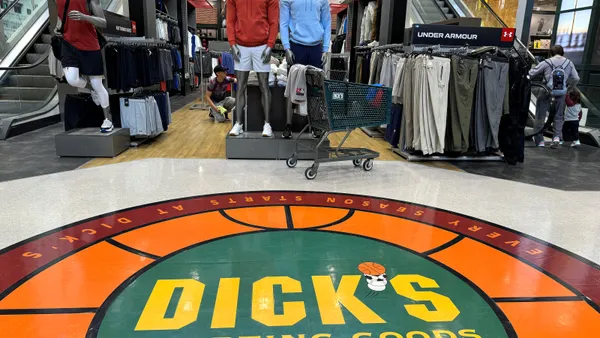Dive Brief:
- MGA Entertainment CEO Isaac Larian is trying to put together a bid for Toys R Us' assets. Larian this week set up a GoFundMe page with the lofty goal of raising $1 billion in crowdfunding by May, led by his own initial donation of $200 million. According to the Associated Press, the bid could include up to 400 stores set for liquidation in the retailer's U.S. wind-down plan. The news organization noted that MGA relies on Toys R Us for around 20% of sales.
- Meanwhile, more than $2 billion in merchandise is going on the market at "deep discounts" as the retailer closes its remaining 735 Toys R Us and Babies R Us stores, according to a Gordon Brothers release. As the liquidations proceed, up to 100,000 gift registries at Babies R Us could be affected by the bankruptcy, CNBC reported Thursday, citing an estimate by Babylist. Some customers have reported unfulfilled orders or have had to transfer registries, according to the news service.
- On Thursday, a week after the big box toy retailer announced plans to liquidate its domestic business, the company's founder, Charles Lazarus, died of heart failure, according to the New York Times. Lazarus originally started the company in 1948 in Washington, D.C., as a baby furniture store before moving to toys. He led the company as chief executive until the 1990s. By then, Toys R Us had more than 1,000 stores and had become a dominant big-box toy seller.
Dive Insight:
In his effort to save Toys R Us from retail death, Larian is invoking the same sentiment that the retailer's attorneys and marketers did at the outset of the company's bankruptcy. Which is to say he is counting on nostalgia.
"Toys R Us is on the verge of permanently closing its doors," the GoFundMe page to save the company said. "It feels like the end of an era, with sad headlines spreading across news and social media, BUT there is still time to save this American icon — and you can help."
Toys R Us, after filing for bankruptcy, harkened back hopefully to millennial memories of the retailer's glory days from the 1980s and 1990s. In a holiday ad campaign, the retailer spliced in footage from vintage commercials. At hearings since last fall, attorneys spoke of the retailer's place as the last remaining national "showroom" for toys, while a rebranding effort focused on the experience and free-play possibility of Toys R Us stores.
All these efforts failed. After a terrible holiday showing — during which Toys R Us was outgunned on price by rivals and made numerous operational bungles — the retailer came well short of earnings targets for its bankruptcy loan. As it breached its covenants and started to run out of cash, lenders began to see full liquidation of the domestic business as the most viable path toward repayment on Toys R Us' massive debt (a hangover from its leveraged buyout by private equity companies last decade).
Larian and the Toys R Us fans kicking in $5, $10 and $100 donations to the GoFundMe page might demonstrate the retailer's underlying value, but to actually make a meaningful go at keeping the retailer alive in something like its current form, they're going to need some bigger dollar contributions.
The challenge they face, along with the current flood of cheap toys from the liquidation sales, are the same Toys R Us has faced for years: competition from well-capitalized rivals that don't solely depend on toys for their livelihood, and so can price them as loss leaders in the holiday season to drive store or web traffic. The company's stores are also, in the view of many, too big, over-merchandised and out-of-date.
In Lazarus' time, the stores filled an important market. But, as Neil Saunders, managing director of GlobalData Retail, pointed out in emailed comments Friday, "Unfortunately, many of the attributes that once made Toys R Us successful eventually became burdens that prevented the firm from competing in a digital era."
Saunders, who described the death of Lazarus as a "sad synchronicity in timing," added: "The passing of Charles Lazarus is an ideal time to remember that retail is not just about numbers, metrics and financials. It's about passion, purpose and strategy."













